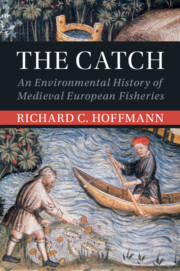Book contents
- The Catch
- Studies in Environment and History
- The Catch
- Copyright page
- Dedication
- Additional material
- Contents
- List of Figures
- List of Maps
- Preface and Acknowledgements
- Abbreviations Used in Notes and Bibliography
- Introduction
- 1 “Natural” Aquatic Ecosystems around Late Holocene Europe
- 2 Protein, Penance, and Prestige
- 3 Take and Eat
- 4 Master Artisans and Local Markets
- 5 Aquatic Systems under Stress, c. 1000–1350
- 6 Cultural Responses to Scarcities of Fish
- 7 Going beyond Natural Local Ecosystems, I
- 8 Going beyond Natural Local Ecosystems, II
- 9 Last Casts
- Appendix A Glossary of European Fishes Named in This Book
- References
- Index
4 - Master Artisans and Local Markets
Published online by Cambridge University Press: 11 May 2023
- The Catch
- Studies in Environment and History
- The Catch
- Copyright page
- Dedication
- Additional material
- Contents
- List of Figures
- List of Maps
- Preface and Acknowledgements
- Abbreviations Used in Notes and Bibliography
- Introduction
- 1 “Natural” Aquatic Ecosystems around Late Holocene Europe
- 2 Protein, Penance, and Prestige
- 3 Take and Eat
- 4 Master Artisans and Local Markets
- 5 Aquatic Systems under Stress, c. 1000–1350
- 6 Cultural Responses to Scarcities of Fish
- 7 Going beyond Natural Local Ecosystems, I
- 8 Going beyond Natural Local Ecosystems, II
- 9 Last Casts
- Appendix A Glossary of European Fishes Named in This Book
- References
- Index
Summary
Artisan fishers broke the early medieval pattern of subsistence fishing. Participants in Europe’s medieval ‘Commercial Revolution’, artisans made their living by catching fish to sell on a local market. Evidence of such people appears around 1000 CE in commercially precocious northern Italy but also in England, France, the Rhineland, and elsewhere. Commonly they arose at or near emerging towns, where skilled subsistence fishers might offer a surplus catch to other non-agricultural specialists. The chapter examines the social position of these household-based fishers, their traditional small-scale technologies, and the collective organizations (guilds) used to manage their human and environmental relations. It then turns to the urban markets where these men and their wives provided fresh fish from nearby waters. In larger towns professional fishmongers consolidated catches from various regional habitats, while communal concern for a safe and abundant supply caused municipal authorities to regulate market dealings. By the late twelfth century the interplay of seasonal demand (Lent) and supply (runs of migratory fish) coupled with cultural criteria of taste and quality shaped fish prices. Whether in great cities like Venice or Paris or small towns on the Castilian plateau or English coast, local markets offered consumers the regional fish they ate.
Keywords
- Type
- Chapter
- Information
- The CatchAn Environmental History of Medieval European Fisheries, pp. 133 - 182Publisher: Cambridge University PressPrint publication year: 2023



